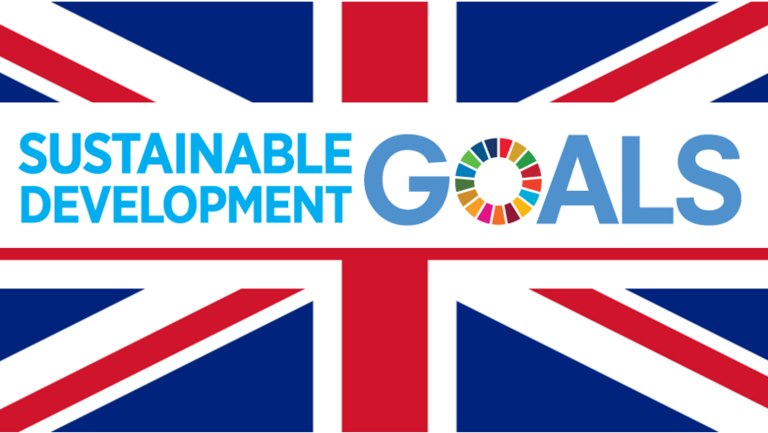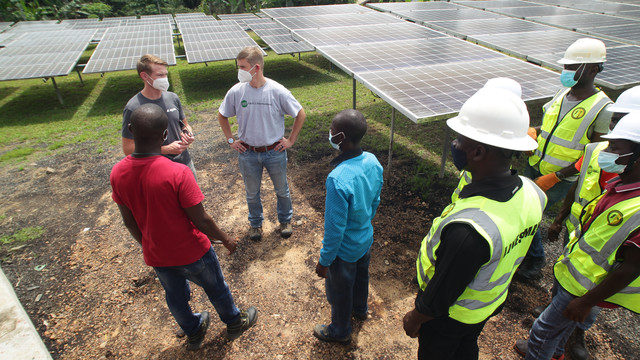Sustainable development in the UK – an issue for party manifestos?
A cross-party report finds the UK government is falling behind on its commitment to sustainability, but the election provides an opportunity for all parties to show the way forward.


The UK flag and the logo for the Sustainable Development Goals
The UK has been in the vanguard of government-led efforts to understand and promote sustainable development since the concept first gained widespread traction in the early 1990s.
It was among the first countries to produce a comprehensive Sustainable Development Strategy in 1994. An independent Sustainable Development Commission (SDC) was created in 2000 to provide advice, analysis and guidance to the government, the UK's regional authorities and to other key stakeholders.
There has been tacit agreement from all British governments over the past 25 years that ensuring the UK becomes more sustainable is an important objective (even though it can come into conflict with other priorities), and that it needs to be tackled domestically as well as in the country's international policies and relations.
As the then Environment Secretary John Gummer put it in 1993: "We've all got to change... schools, parents, families, old people. We cannot pay for our development out of our children's purses."
Even when the SDC was closed down by the coalition government in 2011, Secretary of State Caroline Spelman was at pains to present the decision as a step towards greater commitment (PDF) to achieving sustainable development saying: "We will mainstream sustainability, strengthen the government's performance in this area and put processes in place to join up activity across government much more effectively.
"I am not willing simply to delegate this responsibility to an external body. I have accordingly decided that I will withdraw DEFRA funding from the Sustainable Development Commission at the end of the current financial year, and instead take a personal lead, with an enhanced departmental capability and presence."
A global commitment to sustainability
Since the Sustainable Development Goals (SDGs) came into effect at the beginning of 2016, governments, companies and civil society organisations around the world have been assessing how they can contribute to these ambitious aims and how best to track progress over the next 14 years.
But according to a new parliamentary committee report, the UK government has slipped back from its frontrunner position, and is now in danger of being left behind.
Indeed a new report from the Environmental Audit Committee (EAC), which gathered evidence from all sectors including from IIED, indicates that the UK's commitment is now seriously in question. The Sustainable Development Goals in the UK report recognises the government's strong focus on the UK's international role and the use of development funding to support change in other countries – but says the picture on domestic issues looks very different:
“[T]he Government has shown little interest in, or enthusiasm for, implementing the Goals in the UK. The Government, worryingly, seems to regards the Goals as simply the Millennium Development Goals Mark II, and shows a marked reluctance to take this forward as a domestic agenda.” - EAC report
Areas for improvement
The EAC report highlights a number of serious concerns, as well as steps by which these could be addressed:
- Extremely low levels of public awareness of the goals, or understanding of their relevance to key actors and sectors.
Much can be done to build the SDGs into future educational programmes, the work of the National Health Service and the activities of local, regional and national government. We can learn from rapid progress with high levels of commitment in countries as diverse as Germany, Colombia and Rwanda, where the goals are much better known and applied.
There is already growing interest from UK companies, local authorities, trade unions and civil society organisations in engaging in this effort (see for example the encouraging work of the UK Stakeholders for Sustainable Development network).
- Lack of government leadership on this agenda – the current undertaking to produce 'Single Departmental Plans' and DFID's role as the lead department in Whitehall seem totally inadequate.
A Cabinet-level minister should have responsibility for cross-government action and coherence to implement the SDGs. The government should publish its approach to implementing the goals and report regularly on progress.
- Weak investment in generation of credible data and analysis to enable tracking of progress against key targets.
The Office for National Statistics (ONS) could be given the mandate and funding to generate comprehensive and independent data on SDG implementation. However, the resources requested by ONS to play this role do not seem to have been granted, while responsibility for developing indicators appears to have been split up between government departments as part of their Single Departmental Plans.
The EAC recommends that the ONS should be tasked with generating a credible set of baselines and given the resources to track progress across the set of SDG indicators that are relevant to the UK.
- Inadequate independent scrutiny on domestic implementation of the goals.
The government should establish a new independent public body to advise on sustainable development, with members from academia, business and civil society. This should report directly to the prime minister and the responsible minister.
In effect this would mean recreating the SDC, and following the example set by a growing number of countries that recognise the value of independent scrutiny and expert advice.
Sustainability post-Brexit?
Everything to do with UK politics in 2017 has to have a Brexit angle. The EAC report concludes that as the government puts in place its plans to leave the European Union, steps to demonstrate the country's deep commitment to meeting its obligations to achieve the SDGs within the UK are a vital part of the outward facing, 'global Britain' agenda which the prime minister is keen to promote.
As the political parties develop their manifestos for the forthcoming general election, it’s important that the issues flagged in the EAC Report are not ignored or put on the back burner.
If the UK is to retain its credibility and leadership role on global sustainable development issues it is vital that the government takes seriously its obligations to set ambitious domestic targets, to ensure that these are rigorously tracked, and to work with other UK stakeholders to build awareness and involvement.
Tom Bigg (tom.bigg@iied.org) is head of IIED's Strategy and Learning Group. Read the written evidence IIED submitted to the Environmental Audit Committee.



